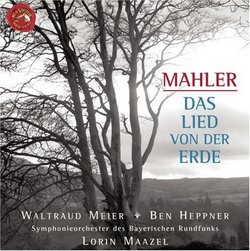| All Artists: Gustav Mahler, Lorin Maazel, Waltraud Meier, Bavarian Radio Symphony Orchestra, Bayerischen Rundfunkorchester, Ben Heppner Title: Mahler: Das Lied von der Erde Members Wishing: 0 Total Copies: 0 Label: RCA Release Date: 8/8/2000 Genre: Classical Styles: Opera & Classical Vocal, Symphonies Number of Discs: 1 SwapaCD Credits: 1 UPC: 743216795727 |
Search - Gustav Mahler, Lorin Maazel, Waltraud Meier :: Mahler: Das Lied von der Erde
 | Gustav Mahler, Lorin Maazel, Waltraud Meier Mahler: Das Lied von der Erde Genre: Classical |
Larger Image |
CD DetailsSimilar CDs |
CD ReviewsRemarkable Synthesis of Song Cycle and Symphony Dr. Christopher Coleman | HONG KONG | 10/24/2000 (5 out of 5 stars) "With Das Lied Von Der Erde (The Song of the Earth), perhaps more than any other, Gustav Mahler succeeded in a task he had been attempting his entire career, blending the intimate world of the song cycle with the vast rhetoric and structure of the symphony. Only a very few works even attempt such a feat--most notable of these are Mahler's own Ruckert Lieder and Kindertotenlieder and Richard Strauss' Four Last Songs. That all of these works take as their subject matter the bittersweet pain of love and loss is only partially due to the Gothic affinities of the late Romantic period. Heroic narrative tales are probably inappropriate for such a synthesis, as they lend themselves more readily to opera or cantata. But simple love poems, on the other hand, are perhaps not sufficiently deep to warrant full symphonic treatment. In Das Lied Mahler adapts German paraphrase poems loosely based on Chinese texts of the Tang Dynasty, selecting and revising material for six movements. These texts represent, as the notes tell us, "a deeply personal vision from the threshold that bounds human life." They are retrospective, though--not at all an anticipation of an afterlife, but instead primarily a gentle look back at life lived fully. After the bravado of the first movement the cycle reconciles with loss, coming to acceptance rather than ending with heartrending grief.The depth of tone and controlled vibrato of soprano Waltraud Meier voice's match the musical requirements perfectly. She and the robustly voiced tenor Ben Happner sing beautifully in this rendition performed by the Bavarian Radio Orchestra directed by Lorin Maazel That Mahler set the songs for both male and female voice alternating movements is another unique feature of this piece; the technique removes the text from a single viewpoint and makes it much more universal. The orchestra, too, is an equal partner--it is not delegated to mere accompaniment, but provides lovely counterpoint to the voice. The voice no longer sings only the tune. Sometimes, in a more operatic, even Wagnerian conception of vocal writing, the singer presents an obbligato, often fragmented, over the orchestral melody.The third movement, Von der Jugend, demonstrates how the late romantic conception of song developed from Schubert's time. The song is essentially strophic--that is, it consists of a single melody presented several times with different words. Schubert, in his strophic settings, would usually repeat the melody and accompaniment exactly, without change. Mahler, on the other hand, uses a technique of continuous development, in which motives are more important than entire themes. Furthermore, all the aspects of music contain potential for variation--the instruments may be changed the second time through, the dynamics varied, the melody ornamented or simplified, the harmonies changed or enriched, even the tempo may be changed. A new melody may be overlaid on top of the old theme. This difference in technique means that while Schubert is primarily concerned with capturing the overall emotional tone of the poem, Mahler can respond to smaller, less structural changes in mood. For Mahler, the musical essence is found in discovering the mood of a single stanza, or perhaps even a single word. Indeed, there is a pervasive use of text painting--birds flutter in violins and flutes whenever the word "vogel" is sung; and the inevitable descent into death is portrayed through descending melodic lines.This is an excellent performance that I recommend highly--my only qualm is about the rather poor English translation of the text." Big hit for Maazel, Heppner and Meier Josef Krebs | Seattle | 01/18/2002 (5 out of 5 stars) "Maazel's Mahler is pretty hit and miss. In fact, it's mostly miss. But here, he scores big. Heppner comes off as slightly heavy and cumbersome in the quick and light #3, but when he's in heroic mode, he's really something to hear. And Meier! She's such a gem in, well, everything here. She's very, very melancholy in #2, very enthusiastic in #4, and even though she gets a little heavy down low, very convincing and beautiful in #6. Every bit as much so as Ludwig.The BRSO live up to all the hype about their ultra-elite status. They play with conviction and awareness. RCA's recording is at once lush and translucent, though that might have more than a little to do with Maazel's superb balances. The climaxes are particularly well represented, nowhere better that in #4.Maazel is spot on throughout. Though I usually prefer a slower tempo in #3, Maazel's quickness here works and pulls us out of the deep depression that Meier drags us through in #2. Everything else is irreproachable.And that's what best characterizes this disk, it's a total interpretation, not a collection of separate songs. A real symphony. So, while as a first recommendation I would still go to Klemperer or Walter or Horenstein, this can sit on the shelf next to any of them."
|


